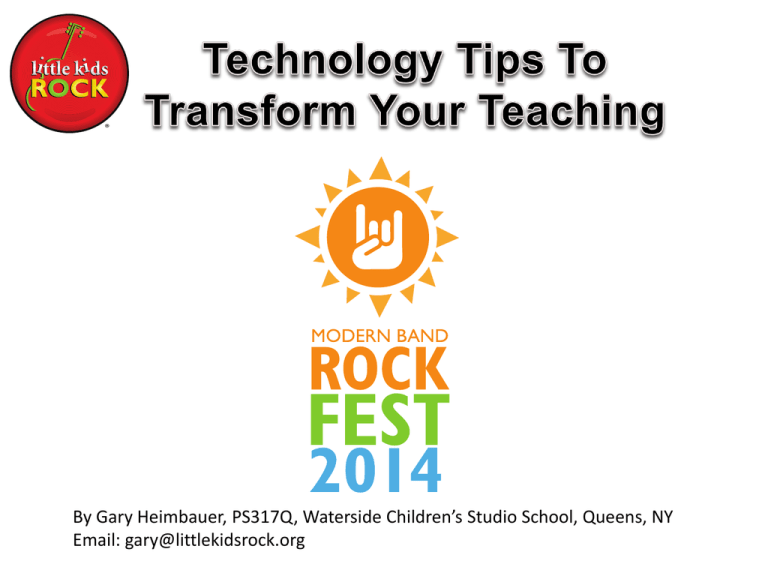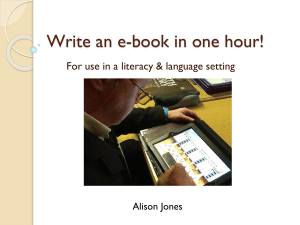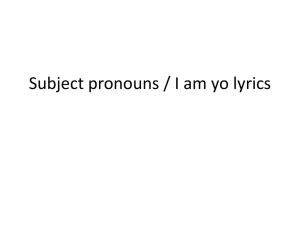scenario 2 - Little Kids Rock
advertisement

By Gary Heimbauer, PS317Q, Waterside Children’s Studio School, Queens, NY Email: gary@littlekidsrock.org What are your favorite ways to use technology in your room? What technologies would you like to have, that you don’t have? As a music teacher, What technologies would you really like to learn more about? -Tips, not tutorials. -Sharing possibilities so that you might see some value and invest afterwards. -At the end, we will have a more open discussion, at which time we can go deeper into topics that you are interested in! - Take notes on anything you want to know more about later. Email me any questions, at any time, to gary@littlekidsrock.org What do Students in Classrooms Look Like in 2014? Students are often sitting in groups Students are working collaboratively Students are working independently Each student or group of students are working on something different, and may rotate around the room (centers). Students are often noisy, partaking in exciting discussions with their peers! No longer is it, teacher leads, children follow for more than only brief instances of a mini-lesson and a demonstration of how to successfully complete a task. Now, teacher facilitates student-centered project/task based learning for all learners on an individual or small group basis. Factors include learning style, interest, strengths, weaknesses, personality, etc. Teachers are often circulating the room, offering their help 1 on 1 or to small groups. Teachers are observing and taking notes. The use of technology is the only way to effectively bring these progressive learning and teaching scenarios happening in public school classrooms, into a Modern Band room. In my experience, unlike with other subjects, using technology is the ONLY WAY to create opportunities for PRACTICAL independent and small group musical experiences in an enclosed space of 20 or more children. Chaotic cacophony just does not work. It is tiring for the kids, the teacher, and is not conducive to creativity and musical achievement. With electric instruments, headphones and splitters, tablets, iRigs, Mini amps, computers, videos, software, the internet, and silent rehearsal modules have opened up a whole new laundry list of ways to teach and learn in the music room. You can average 2000 dollars a year or more in funding through grants, with just a bit of footwork! 1. Donorschoose.org 2. Target Grant 3. Daddario grant 1. Promote your project by making student videos and sharing them with the whole community, who will also share. Try to catch on to a trend or something popular. 2. Do a few small projects instead of one huge one. 3. Donate to other projects within your field or location. 4. Try to find special projects, and make yours fit. Your school may very well have old (OR NEW) iPads, MacBooks, and other useful technology not being used. Last year I got 5 teachers to each loan me 1 ipad from their classroom, and I borrowed 4 iPad 2s that were in the main office, collecting dust. Do not be afraid to petition your friends on facebook too! In the following few slides you will see a list of items that will be discussed in this presentation. Just dream for now, but with some creative strategy, your dreams can come true! Keyboards, Electric Guitars, *ELECTRIC drum kits, electric basses, microphones, cables, amplifiers with aux in, and headphone out (most LKR ones have this feature such as the Fender Mustang) •A great economical option that is easily stored and fits on a snare stand - Yamaha DD-45, plus any keyboard sustain pedal for kick drum feature: • Drum Kit Vid FROM MOST EXPENSIVE TO LEAST EXPENSIVE 4 – 6 iPads or tablets, but the more the merrier. ($1200-1800 for ipads, Much cheaper for tablets) and/or Laptops (hopefully available at your school) jamhub or mixer with headphone amp for silent rehearsals. ($80-$290) Field Recorder (recommended Zoom H2N ) ($90-250) HDTV, projector or smartboard. ($200-too much) Loop Station to teach arranging, harmony, etc. ($150-500) iRig Pro for recording and playing on ipads. ($120) Apple TV or Roku for wireless projection and audio playback ($100) Bluetooth Speakers or Bluetooth Receiver ($50-100) ,Joyo Mini Amp for silent practicing ($12 each) ,Audacity Imovie, etc. for editing sound and video. (Free-$20) Garage Band, Amazing Slow Downer and other apps. (Free-$20) a YouTube page, and Facebook Page (Free) • Lots of 3.5mm to 1/4 in adapters (more info in next slide) • A few mono to stereo 1/4 inch adapters • Lots of Auxiliary Cables, both 3.5 on both ends, and .RCA/3.5mm • Lots of Instrument Cables • Lots of batteries for all your gadgets and keyboards! Headphones and splitters. Recommended: Belkin Rockstar 5 way (12.50), and any well reviewed 2 Way (Y cable, $2-6) Headphones: (search EBay HOSA Headphone Lot) – Seller has warehouse full at up to 90% off retail price. You’ve got 30 band kids in your room. All of the following is happening simultaneously, in the same room: 5 of your singers are learning the lower harmony and 5 are learning the upper harmony of the song” Royals”. One of your drummers is having a really hard time with “Thank You For Being a Friend” (yep, from the Golden Girls) and is working on it alone. There’s a kid on keys and a kid on electric guitar trying to lock up with each other on the bridge to the same song. Another kid is learning the famous keys solo on “Green Onions.” 3 other kids are working on guitar improv phrasing for Green “Onions” by doing call and response, follow the leader, etc. 5 others are working on their guitar chords for “Crazy”. A 4 horn players are working on a 5 up their original in Garageon harmonized horn partrecording as improvisation, Band. an original student composition. Many districts block YouTube, and some people don’t have internet. Options for no internet: - Create your own videos and save to hard drive - Keepvid.com - Youtube Downloader apps Options for blocked youtube with internet: - upload to google “Drive,” share, and stream 5 of your singers are learning the lower harmony and 5 are learning the upper harmony of the song” Royals”. Royals Harmony Video Materials Needed: 2 ipads/ipods/laptops, 2 five way splitters, 10 pairs of headphones, a video explaining/demonstrating/teaching the harmony for them to watch. IMovie Demo 1 • • • • Selecting file Overlaying words creating title editing start and end time Note to self: use kids dancing in Movies folder.. One of your drummers is having a really hard time with “Thank You For Being a Friend” and is working on it alone. MATERIALS NEEDED: electric drum kit (DD-45 or better), double AA batteries or power supply, auxiliary cable, sustain pedal, headphones, iPad/iPod/laptop/tablet with previously made instructional video using rubberBand, Audacity and iMovie, ( Build a Beat Vid ), music stand, drum sticks Steps 1. Change pitch of song with Rubberband or Amazing Slow Downer 2. Rearrange song to make one minute long in Audacity. 3. Take screen shots of drum beats in Build a Beat 4. Combine screen shots and audio in IMovie 5. Overlay my own voice as a guide to following the beat 6. Overlay text This girl spent many hours with this video, and only about 1 hour with me, to help her along. Here is the result: Thank You Contest Video There’s a kid on keys and a kid on electric guitar trying to lock up with each other on the bridge to the same song. MATERIALS NEEDED: electric keyboard, electric guitar, amplifier with auxiliary, and headphone jack (ex: LKR’s Fender Mustang amp) OR Joyo Pocket Amp (think back to Scenario 2). To The NEXT LEVEL… • What if they say they want to play along to the record? • What if they say they want to just play along to the bridge part over and over and, slow it down? • Joyo Pocket amp • Amazing Slow Downer Another kid is learning the famous keys solo on “Green Onions” by Booker T and the MGs, in the key of E (instead of F). MATERIALS NEEDED: keyboard, charts, Joyo pocket amp, Ipad/Ipod/Tablet/laptop with instructional video as well as the program Amazing Slow Downer to control speed and pitch of song, and to loop a section. I might have spent a total of 10 minutes helping Linda with this part. She learned independently through the video and the silent music workstation. The result: Green Onions 3 other kids are working on guitar improv phrasing for “Green Onions” by doing call and response, follow the leader, etc. MATERIALS NEEDED: JamHub or mixer setup, 3 mono to stereo converters, ipad/ipod/mp3 player with song, 3 instrument cables, 3 guitars, 3 pairs of headphones, 3 3.5mm to ¼ in converters, optional mini amps or effects processors, maybe spotify for jamtrack • Victor Wooten Jam Hub Video 5 others are working on their guitar chords for “Crazy”. MATERIALS NEEDED: Acoustic guitars and charts, video source with splitters if requested or needed Justin’s Crazy Video My Crazy Video with no major 7 chords More Great Youtube channels Guitar: Justinguitar Mahalodotcom Piano: For3v3faithful BobGmbH3000 Drums: Drumlessonscom Please share your own favorites! 3 kids are recording their original song in Garage Band using real keys, guitar, vocals and drums, along with the programs virtual instruments. MATERIALS: keyboard, guitar, microphone,electric drum kit, Irig pro, midi cable, guitar cable, mic cable, iPad/iPhone, GarageBand Recording Examples • Show process live.. • Show videos… Geneva Final Product Olivia Final Product -upload to soundcloud or youtube from ipad! Last Scenario • Kids are practicing their harmony parts on their horns. • Materials: A ROOM FOR THEM TO GO IN OR TIME IN MY DAY TO DO SECTIONALS! Without hooking anything up, it is still amazing! -Start with free exploration and showing how to open, save and close app correctly. -Introduce features slowly over the course of a few lessons. -As students get to know features, add parameters, create projects. IPAD AS AMPLIFIER • Irig or Apogee Jam Field Recorder Zoom H2n 2 separate stereo tracks.. -Overlay onto video Turn anything with an auxiliary jack into a Bluetooth speaker! Or just buy bluetooth speakers! -Apple TV or Roku -Switch seemlessly between devices up to 100 or more feet away! -Bypass display to use sound only with optical audio and optical converter. -Use your device to stream video live!! -Or, take video and instantly play back. THIS IS AN OPEN DISCUSSION HERE ARE MY FAVORITES: 1. Idoceo 2. Class Dojo 3. Doceri Looping is a great way to show how parts are put together, and also to practice and demonstrate harmony. It is a way for people to witness the process of composition in real time, and it also invites creativity. Ostinato projects are a great way for students to begin composing. In the same group of 5, please discuss the following for the next 5 -10 minutes, and share: 1. What in this presentation did you see that you would like to begin implementing right away? 2. What kinds of challenges do you think you’ll face, trying to implement this and how will you meet those challenges? 3. Was there anything not covered that you’d like to discuss? Contact me anytime Gary.heimbauer@gmail.com gary@littlekidsrock.org







